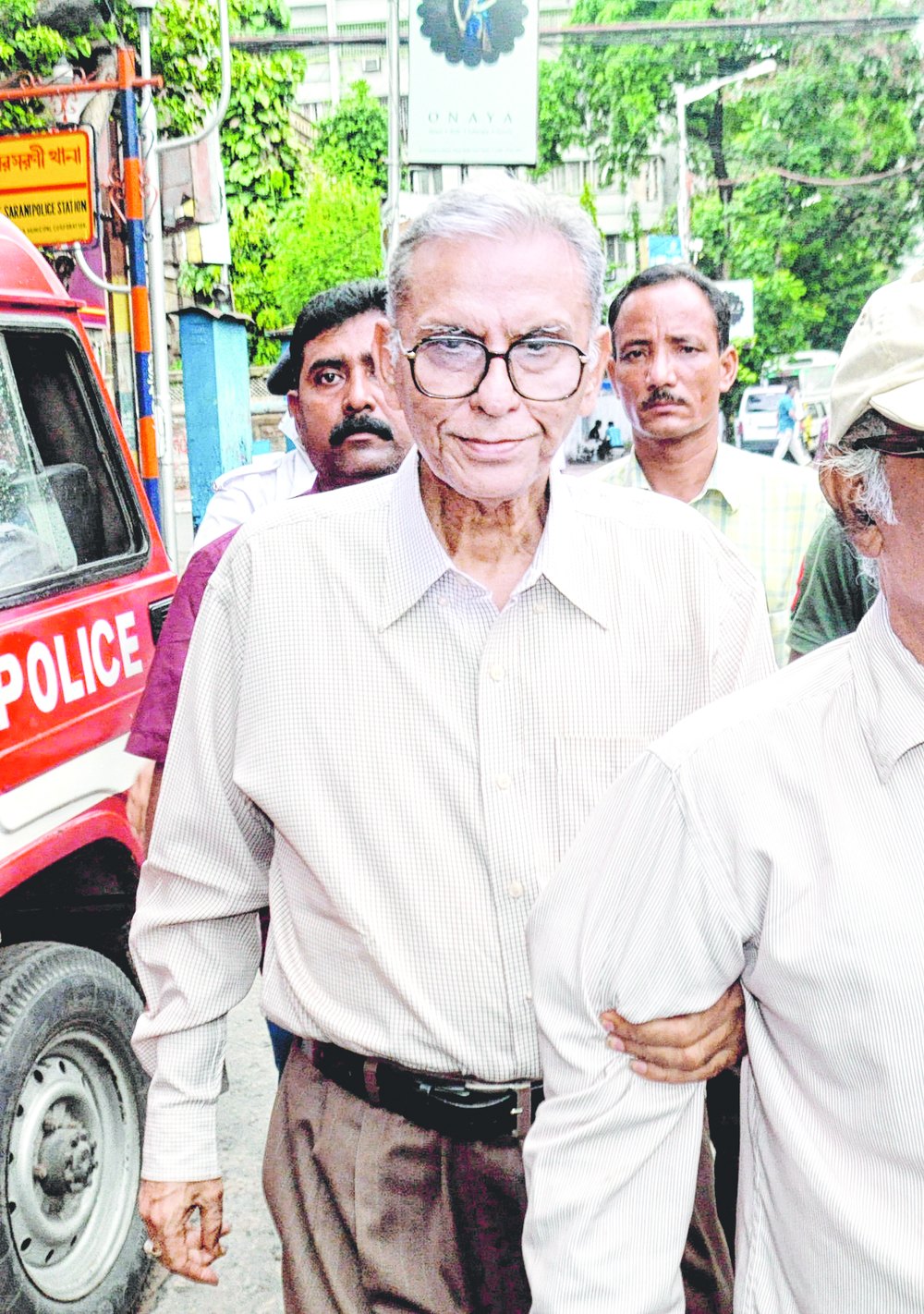
police station on Sunday.
(Mayukh Sengupta)
Arabindo De was not aware of daughter Debjani's death till the last days of his life, investigators probing the Robinson Street case said on Sunday.
According to a diary maintained by Arabindo that police have found, he was under the impression that Debjani was meditating in her brother's room and did not wish to be disturbed - that is what Partho had told his father, sources said.
Debjani - and later Partho too - was a member of the Yogoda Satsang Society of India that follows the teachings of Paramhansa Yogananda, who had taught meditation in the US and other countries between 1920 and 1952. (See Page 19)
"It is clear from the diary entries that he was not aware of Debjani's death for a long time. But it is yet to be known when exactly he came to know," an officer said.
The fact that Arabindo during his last visit to his solicitor Subir Majumdar on June 8 - two days before he was found burnt to death in his bathroom - had said that he was worried how "both his children" would manage after he was gone, indicates that he did not know about Debjani's death till then.
However, in his alleged suicide note dated the same day, Arabindo mentions only his son - "Good Bye Partho, May God Bless you and help you. Love" - suggesting that he came to know of Debjani's death between his visit to the solicitor and writing the note.
The diary entries reveal that Arabindo would often exchange chits with Debjani to communicate. Cops suspect some of the chits found in Arabindo's room apparently written by Debjani might have been written by Partho. In that case, Partho was keeping up the act that his sister was alive and meditating in his room long after she was dead.
"It is clear that Partho and Debjani had become hostile to their father. Arabindo mentions in one of the entries of his diary that he was denied access to the part of the house where Partho and Debjani lived," said an officer.
The fact that Arabindo did not know about Debjani's death also explains what he often told his solicitor about how his daughter sang beautifully. "It is possible that Partho would play her recorded voice to give his father the impression that she was in the room. The father, virtually cut off from that part of the house, would hear her singing and believe that she was well," said an officer.
In the two-bedroom second floor where the family lived, the main entrance opens into a common passage that leads to Arabindo's bedroom on one side of the house. The bathroom and kitchen lie opposite the bedroom. A left turn from the passage takes one to the living room that is attached to Partho's bedroom.
A door in the common passage divided the house into two parts - one where Arabindo lived and the other where Partho lived. The division, investigators believe, helped Partho keep his macabre secret from his father,
Arabindo, unlike his two children who too maintained diaries, would jot down minute details of his day's schedule, mentioning everything he did. It was through the diary entries that investigators realised that Arabindo in the last few months had had several meetings with brother Arun to sort out the sale of the 23-cottah property they jointly owned at 3 Robinson Street.
"They would meet at social clubs or at a CCD to discuss the sale of their property, he has written," sources said.
The police examined Arun and his son at Shakespeare Sarani police station for over two hours on Sunday, apparently to verify facts they found in Arabindo's diary.
Investigators said several discrepancies were found in Arun's statement before the police on Sunday and what he had told them earlier. "He had been saying that on May 11, the day he and his family were invited to his brother's house to celebrate Partho's birthday, he was told that Debjani was at an ashram. Today he said Arabindo had told him that day that Debjani was meditating and didn't wish to be disturbed," said an officer.
The impression that Arun and Arabindo were practically not on talking terms has also been found to be false. During their recent meetings, Arabindo would often discuss Partho's mental state with Arun. "Arabindo was worried that Partho was suffering from depression but had stopped taking anti-depression pills. He had also discussed that Partho needed medical help, Arun admitted on Sunday," sources said.
After Arun stepped out of the police station, he was asked by reporters why he had suppressed facts till now. "I have answered all the questions that police asked me today and I am ready to cooperate with the investigators," he said.
The police are also examining a woman, a resident of central Calcutta who once lived on Robinson Street, believed to be close to Debjani.

